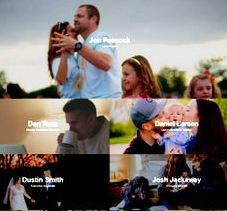
“We want to be mentored, not preached at.”
Two Interesting Studies:
According to a Barna Group study of U.S. church trends published in 2014:
- 59% of Millennials1 who grew up in the church have dropped out.
- Only two in 10 Americans under 30 believe church attendance is important (an all-time low).
- 35% of Millennials1 take an anti-church stance, believing that church does more harm than good.
- Millennials1 are the least likely age group to attend church.
Another study:
On the radio, a 2017 study stated 7 out of 10 Christians currently walk away from their faith when they enter college.
One Millennial’s Perspective on Why These Trends are Happening:
“We want to be mentored, not preached at. Millennials crave relationship, to have someone walking beside them through the muck. We are the generation with the highest ever percentage of fatherless homes. We’re looking for mentors who are authentically invested in our lives and our futures.” – Sam Eaton, a Millennial, in an article on what he thinks Millennials want from churches.
I think Sam’s words ring true. A couple years ago at Willow Creek Community Church, when people in the twenty-something age group were asked what they most wanted from the church, the number one answer was Mentors.
One Possible Solution:
So if Millennials aren’t going to church, and many desire to be mentored in the Church, what can we do about it?
We take the Church to them. We meet them where they’re at. We develop the spiritual mentors they are looking for. We equip and empower people who will be able to walk beside them and help them grow on their faith journeys, no matter what their church attendance. But how many people in the church really know how to do this? Sadly, very few.
This Ministry’s Vision:
One goal of this shepherding ministry is to develop, equip, empower, and envision people to become spiritual mentors.

A Young Church that’s Equipping People to Go and Make Disciples!
Surprisingly, spiritual mentoring is not about telling people what to do or think. It’s about listening and asking good questions that get to the heart of an issue and help people discover the answers for themselves. It’s helping people notice God’s activity in their lives, and encouraging them to respond to what He is prompting them to do. It’s helping them discover their giftedness and living out their unique redemptive purposes in this world. It’s helping remove anything that might get in a person’s way of being and doing what the Lord desires for them.
 This ministry models and provides young leaders the opportunity to experience the impact of being invested in on a personal level. Then it hopefully equips them to do the same with others.
This ministry models and provides young leaders the opportunity to experience the impact of being invested in on a personal level. Then it hopefully equips them to do the same with others.

Another Young Church with an Outward Focus of Renewal in Their City.
I believe the Church needs to change its strategy. Our current system produces more passive spectators, consumers, and analyzers than it produces active disciples who go out and become the loving hands and feet of Christ, partly because people have not been envisioned or equipped to do so. With church attendance dropping, it’s more important than ever that the people of the Church be equipped and empowered to bring the love of God to those who will never enter a church building. Jesus (and his disciples) showed us the way to do this. Will we follow Him?
7 Frequently Asked Questions about this ministry:
How many people are you meeting with? I’m currently meeting with 26 people. At any given time, I’m usually meeting with between 24-30 people. Thirty is my max and tends to be a bit too stressful. I usually meet with 3-4 people per day.
How often do you meet with people? Usually every other week, for an hour and a half.
How long do you meet with people? Usually for about two years.
Where do you find the people you meet with? They tend to find me. I pray often about this, and I believe the Lord directs the right people my way. Ultimately, God finds the people. At this point, most people get connected mainly by word of mouth and through referrals from people who I’ve met with in the past. They send some great candidates my way, who are the kind of leaders who will be able to invest in others, which is an emphasis of this ministry. I also find people through various events I attend. But I don’t spiritually mentor everyone who inquires. Before I commit to spiritually mentoring anyone, I take everyone through an interview and discernment process to make sure we both sense God is in it and that we are a good fit. I also try to sense from God if they’ll be someone who’ll give away what they’ve received, so the fruit multiplies.
What do you do when you’re not meeting with people?
- I attend events my peeps are leading or speaking at. I like to see them in action and support them as best I can.
- I prepare for one-on-one meetingsand special events I’ll be leading.

Moody Bible Institute Resident Life Staff Training
- I lead Training sessions. In addition to one-on-ones, I try to take everyone I meet with through a three session Spiritual Mentoring Training class I developed. Recently, I was invited to do a Spiritual Mentor Training session for the resident life staff at Moody Bible Institute. It went great! One young man said it was the best training they’ve ever had!
- I guide Soul Care sessions with various groups, like the Young Adult Ministries section leaders at Willow Creek and with the staff of some other churches. A couple times this year I’ve been invited to lead sessions aimed at helping core members of a young church mature and grow, by sharing tools and illustrations I’ve found helpful.
- I walk with people through issues that pop up between meetings.
- I also look for resources that might help the people I meet with, pray with and for people, connect with past mentorees, maintain the ministry books, write updates, etc. It’s definitely more than 40 hour a week job.
What does an average mentoring session look like? We usually start with a check-in to see how they are doing and feeling. Then I open it up to any topic they may want to discuss that they are wrestling with, because the issues in life that are rising to the surface is where God is often at work. I assign homework, so we go over their assignment from the prior meeting, which often includes reading a book about an area in which they wish to grow. Time permitting, we do an experiential exercise at the end. I find the spiritual experiential exercises help bring about the softening of heart that needs to occur for transformation to happen. We always close in a time of prayer and then schedule our next meeting.
What’s the biggest challenge you face that you’d like prayer for? Support raising. It’s my least favorite part of the job. Thankfully, I believe so strongly in what God is doing through this ministry, and I’ve seen Him bring about such amazing results, I’m willing to continue to do the hard and humbling work of support raising for the Kingdom. I think everyone should have to raise support at some point in life. It has the potential to change a person’s life and how they view so many things. It’s wonderfully awful, gloriously humbling, and terrifyingly trust-building.
One Question For You:
Will you please partner financially and prayerfully with me to equip and empower more young leaders and mentors who will go outside the church walls to be Christ’s hands and feet in the world He loves?
Please contact me if you are interested.
Contributions are tax deductible.
In His Love,
Randy
Footnote: 1 Per Barna, Millennials are the generation born between 1984 through 2002 (currently between the ages of 15-33).
Often Millennials are currently identified as being between the ages of 20-35 – the target age group of this ministry.
Leave a Reply